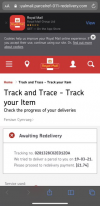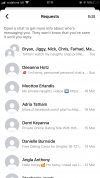-
Our new ticketing site is now live! Using either this or the original site (both powered by TrainSplit) helps support the running of the forum with every ticket purchase! Find out more and ask any questions/give us feedback in this thread!
You are using an out of date browser. It may not display this or other websites correctly.
You should upgrade or use an alternative browser.
You should upgrade or use an alternative browser.
A scam phone calls and emails discussion.
- Thread starter S&CLER
- Start date
Sponsor Post - registered members do not see these adverts; click here to register, or click here to log in
R
RailUK Forums
MarlowDonkey
Established Member
- Joined
- 4 Apr 2013
- Messages
- 1,400
The usual experience on these Amazon etc calls that if you find out the number and ring it back, you just hit the message "The number you have dialled has not been recognised"Ofcom’s advice is not to return a missed call where you don’t recognise the number
Had half-a-dozen text messages on the mobile today, all only partly complete and all from the same number, apparently from British Gas trying to arrange a visit to give me a smart meter. If they can't get the text message sent properly how can I trust one of their smart meters? Or, of course it may some form of scam! I shall ignore them for the time being.
It would also destroy UK business. As an example, we currently receive something like two to three thousand calls a day into our phone system from abroad.What needs doing is BT and UK mobile providers raising the charge they make on incoming calls into their systems from abroad - someone upthread said it is currently trivial. Making it 50p would destroy the business model of many of these scammers.
Not to mention the additional cost for people overseas calling family/friends in the UK.
WelshBluebird
Established Member
- Joined
- 14 Jan 2010
- Messages
- 5,230
As usual the clue is in the domain part of the link. It is something that a lot of people aren't aware of but the it is only the end of the URL that really matters when it comes to determining if a link is genuine or not. The "royalmail" part of that link is just a subdomain of the wider "parcelref-011-redelivery" domain. Subdomains can be named anything so don't tell you anything about the actual legitimacy of that URL, and once you strip that out you are left with "parcelref-011-redelivery.com" which sounds a lot more suspicious!
Of course sometimes the links are obscured in some way, either with a URL shortener (which while useful for some situations, are a security nightmare) or by just having different text to where the link actually goes to (this one is particularly common in emails) so what I've always told people and drummed into my parents is never to click on a link in an email or text. Always go to the website yourself and the navigate to where you need to be.
In terms of the unknown numbers discussion a few posts above, the main issue there is sometimes calls from unknown numbers are expected so you can't always just ignore them (my number is pretty open given I have to give it to most delivery companies for them to phone me so they can actually delivery something!).
Of course sometimes the links are obscured in some way, either with a URL shortener (which while useful for some situations, are a security nightmare) or by just having different text to where the link actually goes to (this one is particularly common in emails) so what I've always told people and drummed into my parents is never to click on a link in an email or text. Always go to the website yourself and the navigate to where you need to be.
In terms of the unknown numbers discussion a few posts above, the main issue there is sometimes calls from unknown numbers are expected so you can't always just ignore them (my number is pretty open given I have to give it to most delivery companies for them to phone me so they can actually delivery something!).
A very good description and explanation of what's going on in that situation. Your advice at the end is particularly important; if you suspect anything about a website/link, go to the site through ways you know to be safe and find the information from there.As usual the clue is in the domain part of the link. It is something that a lot of people aren't aware of but the it is only the end of the URL that really matters when it comes to determining if a link is genuine or not. The "royalmail" part of that link is just a subdomain of the wider "parcelref-011-redelivery" domain. Subdomains can be named anything so don't tell you anything about the actual legitimacy of that URL, and once you strip that out you are left with "parcelref-011-redelivery.com" which sounds a lot more suspicious!
Of course sometimes the links are obscured in some way, either with a URL shortener (which while useful for some situations, are a security nightmare) or by just having different text to where the link actually goes to (this one is particularly common in emails) so what I've always told people and drummed into my parents is never to click on a link in an email or text. Always go to the website yourself and the navigate to where you need to be.
-Peter
Westcountryman
Member
A BBC News article about the (a) Royal Mail scam.

 www.bbc.co.uk
www.bbc.co.uk
A further report from the BBC

 www.bbc.co.uk
www.bbc.co.uk

Royal Mail scam: Fake text led to drama student being defrauded
Thousands of people have retweeted Emmeline Hartley's story after she shared it to warn others.
A further report from the BBC

Covid fraud: £34.5m stolen in pandemic scams
More than 400,000 frauds and other cyber-crimes have been reported to police during the pandemic.
Last edited:
PeterY
Established Member
- Joined
- 2 Apr 2013
- Messages
- 1,350
The BBC did several short articles this morning on scams and what to be aware of. The thing that annoyed me and it's known about 90% of scam calls come from a certain country beginning with "I" and people whose accents aren't English. I'm sure if that was mentioned it'd cut down scams a lot more.
WelshBluebird
Established Member
- Joined
- 14 Jan 2010
- Messages
- 5,230
Got a fun one via email claming to be from EE earlier today. Except my EE account is with my other email address and EE are not going to email me from "custapp6gRVwuXjA0crj7q7VGrw7DTh0BGT @ ofofbehind . com" thank you very much (split it out with spaces to stop it being turned into a link).
Not quite sure how that would cut down on scams where the scam is an email, a text message or a robocaller (which are most of them these days, very few scams are actually a person physically calling you).The BBC did several short articles this morning on scams and what to be aware of. The thing that annoyed me and it's known about 90% of scam calls come from a certain country beginning with "I" and people whose accents aren't English. I'm sure if that was mentioned it'd cut down scams a lot more.
Bevan Price
Established Member
- Joined
- 22 Apr 2010
- Messages
- 7,815
Amongst today's spam were an invitation to come and ***k a "lady", and another to view some "interesting" photographs. Plus the usual rubbish about me having received phoney fortunes.
Romsey
Member
A call from Sky TV technical services went well today. Having said we didn't have any Sky services I was bid, "sorry to disturb you then, have a nice day!" by a real person.
It makes a pleasant change from the recorded announcement telling me that "My Am Az On Prime account has been renewed..."
It makes a pleasant change from the recorded announcement telling me that "My Am Az On Prime account has been renewed..."
BluePenguin
On Moderation
That is a good point. I don’t think anyone anyone in this thread has touched on the enormous amount of porn spam message requests most of us men have been receiving on Facebook for the last year or so. I have been getting several a week for ages nowAmongst today's spam were an invitation to come and ***k a "lady", and another to view some "interesting" photographs. Plus the usual rubbish about me having received phoney fortunes.
Attachments
SuspectUsual
Established Member
- Joined
- 11 Jul 2018
- Messages
- 5,011
Two calls today, one presenting as a London number and one a UK mobile. Both a recorded message from with an American accent telling me “a lawsuit has been filed” against me “at my local county courthouse” and telling me it can be resolved by ringing a number beginning 203 which as far as I can tell is the country code for Egypt.
I’ll sit tight and wait for plod to knock on my door I think
I’ll sit tight and wait for plod to knock on my door I think
Interesting. I bet they're expecting people to dial the number mistaking it for an Outer London number, but that won't work without the '00' access code....and telling me it can be resolved by ringing a number beginning 203 which as far as I can tell is the country code for Egypt.
Loppylugs
Member
You weren't piloting an Evergreen container ship through the Suez Canal were you ?Two calls today, one presenting as a London number and one a UK mobile. Both a recorded message from with an American accent telling me “a lawsuit has been filed” against me “at my local county courthouse” and telling me it can be resolved by ringing a number beginning 203 which as far as I can tell is the country code for Egypt.
I’ll sit tight and wait for plod to knock on my door I think
There was Ship sunk in the Suez Canal during the six days war in 1967. It contained mailbags which were salvaged years later. A news paper printed what they thought the letters contained.
One of them was a letter to someones Bookmaker saying I have had a funny dream. Here is a cheque for £100, put it on Foinavon in the Grand National.
One of them was a letter to someones Bookmaker saying I have had a funny dream. Here is a cheque for £100, put it on Foinavon in the Grand National.
Makes a nice tale, but facts are now easier to find:There was Ship sunk in the Suez Canal during the six days war in 1967. It contained mailbags which were salvaged years later. A news paper printed what they thought the letters contained.
One of them was a letter to someones Bookmaker saying I have had a funny dream. Here is a cheque for £100, put it on Foinavon in the Grand National.
1967 Grand National: 8th April 1967
Six Days War: 5-10 June 1967
GusB
Established Member
Not everyone who lives in the UK has an English accentThe BBC did several short articles this morning on scams and what to be aware of. The thing that annoyed me and it's known about 90% of scam calls come from a certain country beginning with "I" and people whose accents aren't English. I'm sure if that was mentioned it'd cut down scams a lot more.
Xenophon PCDGS
Veteran Member
Not everyone who lives in the UK has an English accent
Conversely, not all that many English people in the UK have the clipped vocal intonations of the female voice in the Tyrrell crisps TV advertisement.
90% of scam calls come from a certain country beginning with "I" and people whose accents aren't English. I'm sure if that was mentioned it'd cut down scams a lot more.
Sounds like you have not followed through with scam phone calls. Only the automated intro is a robot. If you hang on, or "Press 1", or whatever, a real scammer takes over if available. The robot is phoning dozens of numbers at any one time on behalf of perhaps half-a dozen human scammers, ready to pass a positive resonse (ie a voice or a "1" press) to any agent who is not speaking to another mark already. The agents themselves often begin with a rehearsed English accent before lapsing into their natural one. Their natural accent gets stronger and stronger as you wind them up, I find, and eventually they start using their own swearwords. I call that a triumphNot quite sure how that would cut down on scams where the scam is an email, a text message or a robocaller (which are most of them these days, very few scams are actually a person physically calling you).
I wrote :
What needs doing is BT and UK mobile providers raising the charge they make on incoming calls into their systems from abroad
As I understand it, these scammers pay less to phone me from India that it does for me to phone my local plumber. That's bonkers.It would also destroy UK business. As an example, we currently receive something like two to three thousand calls a day into our phone system from abroad.
Not to mention the additional cost for people overseas calling family/friends in the UK.
IDK what you mean by "we", your company (sounds a lot) or the UK (sounds far too few). Just one scam centre of say 10 agents (and there are hundreds of centres) will be making robot calls to thousands of numbers in the west every day, many of which will connect and some will get as far as a conversation - enough to keep the agents busy. A connection charge of 50p or £1 would badly damage the economics of their scam business while having hardly any effect on legitmate business calls.
While phone tech has been vastly upgraded in the last decades, the costing algorithms seem stuck in the past, so scammers are able exploit low-cost wormholes through the system. The costing system needs reform.
SargeNpton
Established Member
- Joined
- 19 Nov 2018
- Messages
- 1,389
203 is the internal USA dialling code for part of Connecticut; which would fit in with the American bias of the rest of the message.Two calls today, one presenting as a London number and one a UK mobile. Both a recorded message from with an American accent telling me “a lawsuit has been filed” against me “at my local county courthouse” and telling me it can be resolved by ringing a number beginning 203 which as far as I can tell is the country code for Egypt.
I’ll sit tight and wait for plod to knock on my door I think
My company. We sell our products in something like 100 countries, so we get calls from all over the world.IDK what you mean by "we", your company (sounds a lot) or the UK (sounds far too few).
When you're providing an international toll free number and receive thousands of calls a day it definitely would! Not to mention that is swimming against the flow which has been towards lower charges, not higher.A connection charge of 50p or £1 would badly damage the economics of their scam business while having hardly any effect on legitmate business calls.
It also ignores the elephant in the room: the spammers calls most likely hit the PSTN from an in-country endpoint.
I'm interested in your proposal for reforming the system...While phone tech has been vastly upgraded in the last decades, the costing algorithms seem stuck in the past...
Mcr Warrior
Veteran Member
- Joined
- 8 Jan 2009
- Messages
- 14,638
BBC Radio 4's "Money Box" programme currently running with a story/recording of a (typical?) phone scam. Phone number spoofing seems to be a significant contributory problem.
Last edited:
It's because the tech industry (and regulators) haven't done a good enough job educating people that the phone number or email address that a message proports to originate from is provided merely as a convenience and doesn't provide any guarantee of identity.Phone number spoofing seems to be a significant contributory problem.
The education system also needs to pay it's part in equipping people with the critical thinking skills needed to recognise when something isn't right.
Mcr Warrior
Veteran Member
- Joined
- 8 Jan 2009
- Messages
- 14,638
It was (almost) funny listening to one of the interviewees trying to explain and defend the telecoms industry's (less than) proactive response to the issue.It's because the tech industry (and regulators) haven't done a good enough job educating people that the phone number or email address that a message proports to originate from is provided merely as a convenience and doesn't provide any guarantee of identity.
The thing is, there's almost no way to stop spoofing. It would require a complete redesign of the telephone system.It was (almost) funny listening to one of the interviewees trying to explain and defend the telecoms industry's (less than) proactive response to the issue.
Mcr Warrior
Veteran Member
- Joined
- 8 Jan 2009
- Messages
- 14,638
Which of course is what potential fraudsters will endeavour to take advantage of.The thing is, there's almost no way to stop spoofing. It would require a complete redesign of the telephone system.
Indeed, they will. Which is why telcos and regulators need to make people more aware that the presentation number is not a guarantee of identity.Which of course is what potential fraudsters will endeavour to take advantage of.
A Challenge
Established Member
- Joined
- 24 Sep 2016
- Messages
- 2,835
I've got no-one with a similar phone number to me that I know, so given they seem to use these this is unlikely to happen to me, but given that most of the presentation numbers used by the fraudsters are real numbers, surely at some point they must get a number that is actually in the recipient's phone as it is a contact's number? I know if it says a friend has called you and the voice you get is robotic or some random person in India (even if you know quite a few people with similar accents who might be phoning you, you should be able to tell the difference) it is unlikely you'll think it is them, but I was just wondering if the presentation number matched, presumably it would still show up as the contact?







